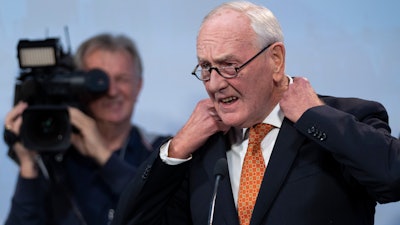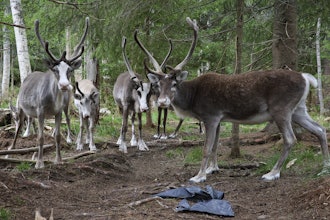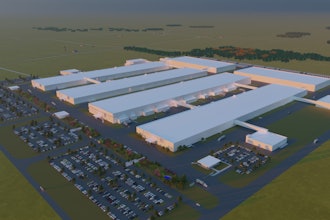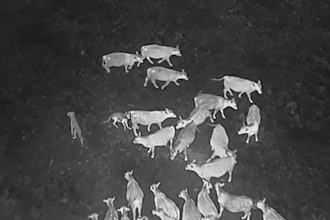
THE HAGUE, Netherlands (AP) — An independent expert appointed to mediate in the bitter dispute between the Dutch government and the nation's farmers over plans to drastically slash emissions of nitrogen and ammonia presented a report Wednesday that included a suggestion that the government buy out hundreds of the heaviest polluters.
The report could reignite protests by farmers who say their way of life is under threat and cause tensions in Prime Minister Mark Rutte’s four-party ruling coalition over how best to move forward. Two tractors parked in a peaceful protest outside the temporary home of the Dutch parliament as the report was unveiled.
Johan Remkes said in his 58-page report that he called “a line of thought, not a plan,” that “it is necessary in the very short term to emit much less nitrogen.”
If that doesn't happen, “the Netherlands will be locked up because it will be legally almost impossible to issue permits. Not for houses, not for farms, not for roads.”
He added: “I write this with a heavy heart, but I see no other way.”
Remkes suggested the government buy out within a year 500-600 of the heaviest polluters — from the agricultural and business world.
He said by targeting the biggest farms only 1% of the farming community would be directly affected.
“I don’t expect the agricultural sector will be happy with this report,” Remkes wrote, but added that he believed it was important to present an “honest story.”
Bart Kemp, leader of the Agractie farmers' group, said that the report contained “positive things but also very worrying points.” He said that compulsory buying out of farms was out of the question for his organization.
Remkes held a series of meetings over the summer with farmers, government ministers, environmentalists and other sectors in a bid to soothe soaring tensions over the government's plans to halve nitrogen emissions by 2030.
The government announcement in June that farmers and regional authorities had a year to draw up plans for the reductions unleashed a wave of protest by irate farmers who blocked roads with their tractors, dumped garbage — including in some cases asbestos — on highways and torched bales of hay. Around the nation, farmers and their supporters have hung Dutch flags upside down as a sign of their anger.
Remkes handed his report to the new Minister for Agriculture, Nature and Food Quality, Piet Adema, and the minister responsible for nitrogen policy, Christianne van der Wal. She said the government would study the report and give a formal reaction on Oct. 14.
Adema said he wanted to visit rural areas to discuss the report's contents with farmers.
Rutte tweeted his thanks to Remkes for the report and said the government would study it “and I hope that we, together with all parties — farmers, nature organizations, businesses and governments — can make progress because the urgency remains great.”
The government says emissions of nitrogen and ammonia produced by livestock, as well as by heavy industry and the transport sector, must be drastically reduced close to nature areas that are part of a network of protected habitats for endangered plants and wildlife stretching across the 27-nation European Union.
The government has earmarked billions of euros (dollars) to fund the transition.
Farmers say their very livelihoods are under threat and argue that they are being unfairly targeted while other polluters face less far-reaching rules.






















